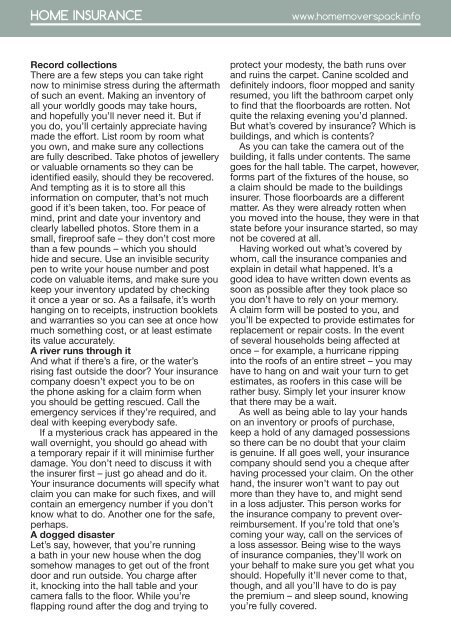Create successful ePaper yourself
Turn your PDF publications into a flip-book with our unique Google optimized e-Paper software.
HOME INSURANCE<br />
www.homemoverspack.info<br />
Record collections<br />
There are a few steps you can take right<br />
now to minimise stress during the aftermath<br />
of such an event. Making an inventory of<br />
all your worldly goods may take hours,<br />
and hopefully you’ll never need it. But if<br />
you do, you’ll certainly appreciate having<br />
made the effort. List room by room what<br />
you own, and make sure any collections<br />
are fully described. Take photos of jewellery<br />
or valuable ornaments so they can be<br />
identified easily, should they be recovered.<br />
And tempting as it is to store all this<br />
information on computer, that’s not much<br />
good if it’s been taken, too. For peace of<br />
mind, print and date your inventory and<br />
clearly labelled photos. Store them in a<br />
small, fireproof safe – they don’t cost more<br />
than a few pounds – which you should<br />
hide and secure. Use an invisible security<br />
pen to write your house number and post<br />
code on valuable items, and make sure you<br />
keep your inventory updated by checking<br />
it once a year or so. As a failsafe, it’s worth<br />
hanging on to receipts, instruction booklets<br />
and warranties so you can see at once how<br />
much something cost, or at least estimate<br />
its value accurately.<br />
A river runs through it<br />
And what if there’s a fire, or the water’s<br />
rising fast outside the door? Your insurance<br />
company doesn’t expect you to be on<br />
the phone asking for a claim form when<br />
you should be getting rescued. Call the<br />
emergency services if they’re required, and<br />
deal with keeping everybody safe.<br />
If a mysterious crack has appeared in the<br />
wall overnight, you should go ahead with<br />
a temporary repair if it will minimise further<br />
damage. You don’t need to discuss it with<br />
the insurer first – just go ahead and do it.<br />
Your insurance documents will specify what<br />
claim you can make for such fixes, and will<br />
contain an emergency number if you don’t<br />
know what to do. Another one for the safe,<br />
perhaps.<br />
A dogged disaster<br />
Let’s say, however, that you’re running<br />
a bath in your new house when the dog<br />
somehow manages to get out of the front<br />
door and run outside. You charge after<br />
it, knocking into the hall table and your<br />
camera falls to the floor. While you’re<br />
flapping round after the dog and trying to<br />
protect your modesty, the bath runs over<br />
and ruins the carpet. Canine scolded and<br />
definitely indoors, floor mopped and sanity<br />
resumed, you lift the bathroom carpet only<br />
to find that the floorboards are rotten. Not<br />
quite the relaxing evening you’d planned.<br />
But what’s covered by insurance? Which is<br />
buildings, and which is contents?<br />
As you can take the camera out of the<br />
building, it falls under contents. The same<br />
goes for the hall table. The carpet, however,<br />
forms part of the fixtures of the house, so<br />
a claim should be made to the buildings<br />
insurer. Those floorboards are a different<br />
matter. As they were already rotten when<br />
you moved into the house, they were in that<br />
state before your insurance started, so may<br />
not be covered at all.<br />
Having worked out what’s covered by<br />
whom, call the insurance companies and<br />
explain in detail what happened. It’s a<br />
good idea to have written down events as<br />
soon as possible after they took place so<br />
you don’t have to rely on your memory.<br />
A claim form will be posted to you, and<br />
you’ll be expected to provide estimates for<br />
replacement or repair costs. In the event<br />
of several households being affected at<br />
once – for example, a hurricane ripping<br />
into the roofs of an entire street – you may<br />
have to hang on and wait your turn to get<br />
estimates, as roofers in this case will be<br />
rather busy. Simply let your insurer know<br />
that there may be a wait.<br />
As well as being able to lay your hands<br />
on an inventory or proofs of purchase,<br />
keep a hold of any damaged possessions<br />
so there can be no doubt that your claim<br />
is genuine. If all goes well, your insurance<br />
company should send you a cheque after<br />
having processed your claim. On the other<br />
hand, the insurer won’t want to pay out<br />
more than they have to, and might send<br />
in a loss adjuster. This person works for<br />
the insurance company to prevent overreimbursement.<br />
If you’re told that one’s<br />
coming your way, call on the services of<br />
a loss assessor. Being wise to the ways<br />
of insurance companies, they’ll work on<br />
your behalf to make sure you get what you<br />
should. Hopefully it’ll never come to that,<br />
though, and all you’ll have to do is pay<br />
the premium – and sleep sound, knowing<br />
you’re fully covered.













